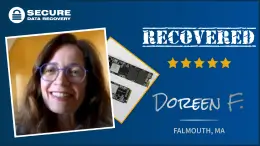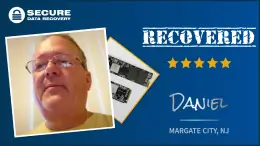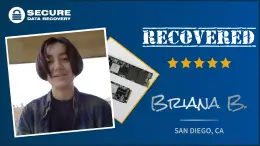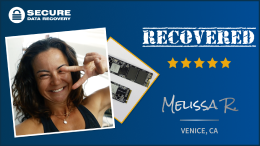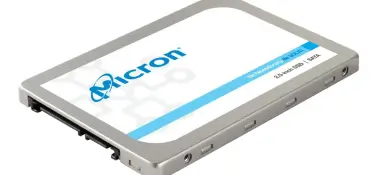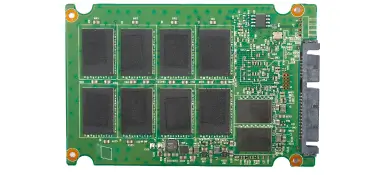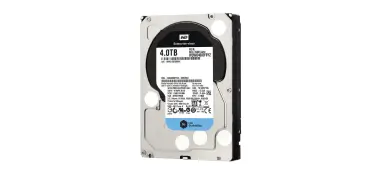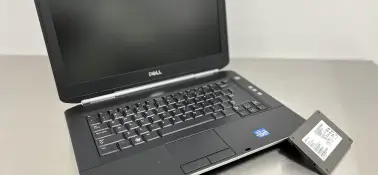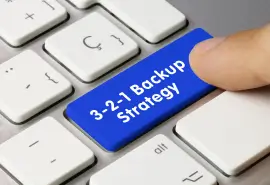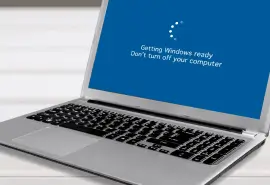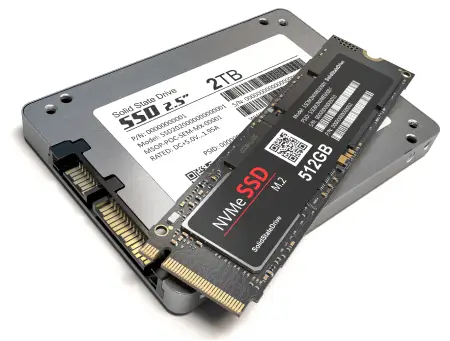
SSD Data Recovery Experts
We provide professional SSD data recovery for solid-state drives regardless of brand, cell architecture, form factor, interface, or file system. Our engineers have decades of experience with NAND flash storage and understand how modern SSDs work. Our proven tools and techniques have resolved thousands of cases, from system drives in PCs and laptops to Macs and external SSDs. Trust the data recovery service with free quotes, a 96% success rate, and a No Data, No Recovery Fee guarantee. We can restore your important data.
We Helped Thousands Get Their Lost Data Back
With over 7,138 satisfied customers and counting, we are proud to provide the service and results that exceed your expectations. Hear what they have to say.
View AllCertified Solid-State Drive Recovery
Since 2007, we have partnered with leading brands and invested in ongoing research to develop new tools and techniques. As a result, we can provide solid-state drive recovery solutions for home users and enterprise clients that others cannot.
Our SSD experts have encountered numerous data loss events. We have resolved cases involving exhaustion, controller failure, corruption, electrical issues, physical damage, and deletion, to name just a few. That is possible because we have talented technicians, groundbreaking software, state-of-the-art soldering stations, and an extensive collection of replacement parts. Whatever the case, our best-in-class tools give you the best chance to reclaim your important data.
What To Expect With Us:
- Free Diagnostics and Quote
- No Data, No Recovery Fee Guarantee
- Specialized Hardware and Software
- Large Library of SSD Components
- Most Industry-Specific Certifications
NAND Flash Specialists
Our history of innovation is an asset as solid-state drives continue to evolve. SSDs electronically store data in billions of NAND flash memory cells and offer much greater speeds than hard disk drives. However, form factors and architecture vary between drives. Your SSD might have single-level cells (SLC), multi-level cells (MLC), triple-level cells (TLC), or quad-level cells (QLC). Cells with higher density are more intricate and demand more advanced techniques. No matter the design, we can restore your data.
We also specialize in other SSD technologies. SSDs have complex algorithms and processes that help the device function but complicate data recovery. They include wear-leveling, error correction, garbage collection, compression, overprovisioning, deduplication, and encryption. It is critical to understand these methods and their impact on recovering data to maximize the odds of success. And our team does.
Examples of Supported SSD Hardware:
- 2.5-inch and M.2 SSDs
- NVMe
- PCIe
- SATA
- SAS
Partners With Storage Companies
We partner with the most respected SSD brands in the storage industry. These close ties provide unique access and insights into hundreds of solid-state drives. That knowledge allows us to deliver the best service to you without voiding your warranty. Data loss can be unavoidable. But, when it does occur, we are prepared to reverse it. We can get your data back regardless of the brand, model, file system, and operating system of your SSD. Here are some of our close partners.
Apple Data Recovery for NAND Flash Memory

Apple uses NAND flash storage across its laptops, desktops, and mobile devices. Our Mac data recovery experts have experience with all Apple hardware and macOS versions. Modern MacBooks, iMacs, Mac minis, and Mac Studios have SSD modules that are soldered right onto the board. As an Apple Certified Mac Technician (ACMT), we can extract data from these integrated designs without destroying it. We can also restore data from SSDs in Mac Pro workstations and Fusion Drives in older models.
We are proud to be part of the Apple Authorized Service Provider (AASP) program. Being a trusted member provides access to genuine Apple parts, tools, and resources, ensuring we meet the highest standards.
Retrieve Data From SSDs With Encryption
Many solid-state drives have encryption by default. However, most SSDs differ in how they encrypt data. As a result, encryption can present several obstacles, but it does not prevent us from retrieving your data. These drives often store keys in a secure area of the drive. In cases with damaged controllers or firmware and corruption, they can be difficult to reach. Some encrypted SSDs also limit the amount of attempts. That makes it vital to get it right the first time. Call one of our experts to learn more about encrypted data recovery.
Verified Reviews
Data Recovered
Thanks to Scott and his team we were able to successfully recover some very important data for a client - thanks again Scott!!
They did it!!! They got all my data back
I had a wonderful experience with james g. He was extremely professional and very insightful.He took very good care to ensure that my data was ?? % recovered.And for that I am grateful. He never pressured me.He just made me feel comfortable in every decision that I made with every question that I had.
I didn''t expect to have everything back but they indeed recovered all of my data
Recovering data
SecureData Recovery Services did an outstanding job recovering my data. The team was professional, patient, and kept me informed at every step. I was able to access my files again without any issues. I highly recommend their service.
Years of perfect results
I have an ancient laptop that has seen some epic adventures; Scott McMacken and team restore my data after each one. Thank you.
Scott McMacken & team excel at customer service
From my initial phone call through the completion of my pickup, I spoke with Scott and other associates (when Scott was unavailable) multiple times by phone and email. Every interaction was professional, friendly, patient, and helpful. Scott was consistently well-informed about my case and never required me to re-explain details. When there was confusion regarding which recovery device my data sho... Read More
Satisfied customer
Thank you Jason M & Company. Secure Data Recovery Services were very successful in retrieving my very personal and sentimental data when my computer "died". Michele F.
Common Causes of Data Loss
While SSDs are seen as more reliable than other storage options, the devices can still fail. Also, SSDs frequently have different failure modes compared to hard drives. Resolving these issues requires a separate set of skills and tools. Some of the most common causes of data loss for SSDs include:
- Exhaustion: NAND flash memory has a finite number of write cycles. When an SSD reaches its limit, its data may become inaccessible.
- Controller Failure: An SSD controller manages stored data across billions of cells. Without it, the drive will not function.
- Corruption: The amount of bad blocks in SSDs increases with continued use despite efforts to mitigate that effect. If the device saves data to these sections, it could lead to file corruption.
- Firmware Damage: Firmware dictates how that specific SSD operates. Damaged firmware impacts performance and data storage.
- Power Surge: A sudden power spike can ruin electronic components on the SSD’s printed circuit board (PCB).
- Unstable Voltage: Similar to power surges, an erratic electrical supply can destroy essential components on the PCB.
- Physical Damage: SSDs are durable devices, but they are not immune to physical or thermal damage. Degraded cells and burnt-out electronics can prevent people from accessing their files.
- Manufacturer Defect: Sometimes, SSDs can have defective connectors, components, or solder joints due to poor materials or placement errors.
SSD Repair
The powerful electronics of flash storage lead to better performance and smaller form factors. Unfortunately, those components make repairing SSDs and retrieving files from their memory cells even more difficult. Many data loss cases involving SSDs feature physical issues that disrupt routine read and write operations. Other incidents result from logical errors that cause the drive to malfunction. Returning a failed SSD to a working condition requires advanced tools and technical expertise.
We have the custom hardware, specialized software, and NAND experience to repair severe physical and logical damage. This could mean using our soldering stations to replace defective electronics on the SSD’s circuit board. It could also mean bypassing the controller of an undetected SSD. We can upload code that mimics the device’s firmware to access flash memory directly and locate translator tables.
No matter the cause of SSD data loss, our team knows how to recover it. Start your case today.
Frequently Asked Questions
-
How much does it cost to recover data from an SSD?
It varies. The cost depends on the complexity of your case. We offer a free diagnostic of your solid-state drive to determine the cause of data loss. At that point, we present an exact quote for the recovery that you can accept or reject. Payment is due once we provide proof of your recovered files. Contact us to learn more about our process.
-
Can SSD data be recovered?
Yes. However, for the best results, you need a service that specializes in SSDs. We have the tools and expertise to resolve the toughest data loss cases. Since 2007, our engineers have maintained a 96% success rate across all media types.
-
Why is it harder to recover data from an SSD?
SSDs have sophisticated algorithms and processes that scatter data across billions of cells. Plus, many SSDs encrypt data, and those methods vary from model to model. These features make locating and recovering lost data on SSDs harder than other storage devices.
-
Do you have several recovery options?
Yes. In addition to our standard service, we have expedited and emergency options. Our emergency service is available 24/7 if needed and offers turnaround times of less than 48 hours. We can also provide remote and onsite services if required.
-
Are your results guaranteed?
Yes. We stand by our No Data, No Recovery Fee guarantee. We get your data back, or you pay nothing.
-
How do you return my recovered files?
Upon payment, we return your recovered data on a secure device of your choosing.
-
Can I recover my files with free data recovery software?
It is possible. However, most file recovery software is ineffective when it comes to SSDs. Consider a professional service if the data is truly critical. Learn the risks before proceeding with software.

